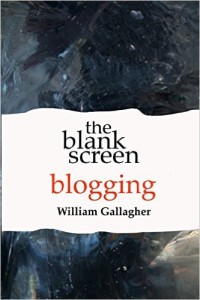Earlier this year I wrote a piece called You’re On Your Own and It’s Necessary. I did it over on my personal blog, Self Distract, but it so belonged here that I nicked it for the book Filling the Blank Screen.
The point of it was that we naturally turn to others when we are hoping to do something new but those others naturally hold us back. It’s a sticky subject and a rocky road but we do make ourselves into the people we are and our friends tend to be ten minutes behind us while our families can be years and years behind us.
What I recommended in the piece was that you seek out people who are doing what you want to do and you ask them about it. They are naturally going to be biased: if it’s worked for them, they will be enthusiastic and if it hasn’t, they’ll be over-enthusiastic to cover that they were wrong. But still right or wrong, genuine or false, real or not, they are speaking from experience.
I keep thinking and thinking about a writer I hired once. This was a very long time ago and what specific details I can remember, I can’t tell you. But let’s say he had a very specific niche he wrote in. That’s what I hired him for and he was fine, I was happy with the piece. We chatted away during the process, though, and he told me that he’d discussed this niche with his wife and they are concluded that he needed to invest in rather a lot of specialised equipment so that he was able to write from authority. I can picture that conversation, I’ve had that conversation, and it scares me.
Here were two smart people discussing something crucial to their futures. And I don’t know, but I had the impression his wife wasn’t a writer and wasn’t in this specialised niche. So her best source of information about it was her husband.
And I thought he was wrong.
This specialised equipment was expensive and it changes a lot, he would be spending a lot of money now and then regularly spending a lot more. I wasn’t sure there was enough interest in this specialism to earn him much money writing about it. He got that article out of me but I never returned to the topic while I was on that magazine.
I just think a lot about this pair discussing and deciding their futures based on a possibly false premise. I think about it a lot. I think about it especially when having potentially similar conversations with my wife, Angela. We discuss everything and I need her, I don’t feel I know something until I’ve got her take on it.
But very many times she will be working from only what I’ve told her. What if I’m wrong?
And I am wrong, of course, I am wrong often. Such as when I started writing this to you and I had an idea that I wanted to explore certain things. It was going to be all about that previous article – it was recently picked up by another site and I’ve had head-jerkingly gorgeous comments on it – and it was going to be about more. I was thinking about how when we write for places we can be deeply embedded there yet we can also be outsiders.
I was going to explore that as a way of baring my soul a bit to you. Making myself uncomfortable about it because I’m working with about ten groups and organisations and eight of them are making me feel terribly important, terribly good. But that leaves two where I am and I feel that I am an outsider.
I was going to examine why this was affecting me when I’m a writer and I am self-employed: I really belong only and solely to my own group, my own company. I was thinking about how you go native and it can colour how you see things.
But instead I went off into this business of whether I am wrong, whether we are wrong, ultimately whether we can ever be right. That cuts closer to me than even this inclusion/exclusion topic that is so on my mind this weekend. And I know that you’re finding it a bit miserable. I can see it in you.
You’re wrong.
Yes, we can end up making our decisions based on faulty or incomplete premises. We can certainly put too much on the shoulders of our partners even as we deny them impartial or better sources of information. But isn’t that life?
And isn’t that actually rather good? Scary, sure, but also alive.
I was with someone today who was going to a music festival specifically to find out what it was like, in fact going in order to have gone. She was planning it like mad, she spoke of finding out the rules when she gets there. I’ve never been to a music festival but it seems to me that the point of it, beyond hopefully enjoying the music, is to dive in without a plan, without all that much thought, and just swim.
It reminded me of a line in Doctor Who where Christopher Eccleston, performing a Russell T Davies script, says to a new companion that:
“The thing is, Adam, time travel is like visiting Paris. You can’t just read the guidebook, you’ve got to throw yourself in. Eat the food, use the wrong verbs, get charged double and end up kissing complete strangers – or is that just me?”
It gets harder. It really gets harder. But without deliberately making bad choices, without deliberately deluding yourself, take the impossibility of predicting the future as an excuse, as a reason, to go make as many futures as you can.
